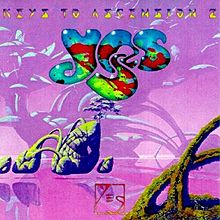
Keys to Ascension 2 (1997)

1. I've Seen All Good People
2. Going for the One
3. Time and a Word
4. Close to the Edge
5. Turn of the Century
6. And You and I
7. Mind Drive
8. Foot Prints
9. Bring Me to the Power
10.Children of the Light
11.Sign Language
It’s not often you see a band name their new album by simply tacking a “2” onto the end of the last one. Outside of debut-sequel combos for brand-new artists, it’s pretty rare. But with Keys to Ascension 2, it actually makes a weird kind of sense. The format is nearly identical to its predecessor, right down to the blend of live and studio material. It really is less a new concept than a straight-up continuation. Honestly, they could have just called the whole thing Keys to Ascension Volumes 1 & 2 and saved everyone the cataloging headache.
Backing up for context: the first Keys to Ascension was a big deal at the time because it reunited one of the band’s “classic” lineups—Jon Anderson, Chris Squire, Steve Howe, Rick Wakeman, and Alan White. It was, at least officially, meant for a handful of reunion shows in California, but they made the most of it. The first set gave us an excellent live album plus two brand-new studio tracks that, in true Yes fashion, ran about half an hour combined. It was classic Yes excess, but done well enough that fans largely embraced it.
This second installment is cut from exactly the same cloth. More live recordings from those same reunion shows, paired with additional new studio tracks. So yeah—naming it Keys to Ascension 2 is on the nose but totally logical. There’s no attempt to rebrand or pretend this is anything but the second half of the same project.
As with the first release, the live portion here is solid. No big surprises in the setlist, but the performances are polished and energized. This was a band that hadn’t played together in this configuration in years, but they still knew how to lock in. For longtime fans, hearing this lineup run through the old epics is pure comfort food, and even the more divisive material is performed with conviction.
The studio tracks? They’re a bit more polarizing. Personally, I think they’re quite good—maybe not as strong as the two from the first Keys, but well worth the time. The split between live and studio is also a bit more even here, which gives the whole package a more balanced feel. Critics and some fans have argued these five new tracks are weaker or more meandering, but that feels like splitting hairs. Even at their most indulgent, there’s something rewarding about hearing Yes take their time, stretch out, and craft these sprawling pieces. This is the same band that once gave us Close to the Edge and The Gates of Delirium, after all—excess is part of the DNA.
In hindsight, the big criticism isn’t about the music itself but the packaging. It might have made a lot more sense to split things cleanly: one big live album, one separate studio release. In fact, they eventually did bundle all the studio tracks onto a single collection a few years later, and it was better received in that format. But at the time, it seems like the band couldn’t quite agree on how best to present the material. It wouldn’t be the first time Yes were their own worst enemy when it came to logistics.
And of course, this being Yes, the lineup stability was short-lived. Keys to Ascension 2 effectively marks the end of this particular reunion in the studio. After this, every subsequent album would feature yet another version of the band. Surprised? Of course not. It’s Yes. Constant reinvention, constant turnover—that’s practically their brand. But for one brief moment in the mid-90s, they pulled the classic lineup back together and managed to deliver two companion albums that, despite their quirks, stand as strong entries in the later-period catalog. Keys to Ascension 2 might not reinvent the wheel, but it’s a more-than-worthy follow-up that deserved better than to be treated as an afterthought.
Go to the Next Review
Go back to the main page